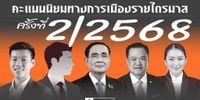On June 29, 2025, the National Institute of Development Administration (NIDA) released the results of its Political Preference Survey for the second quarter of 2568, revealing the latest trends in Thailand's political landscape. Conducted between June 19 and 25, the survey gathered responses from 2,500 citizens aged 18 and above, representing a broad spectrum of regions, educational backgrounds, occupations, and income levels across the country.
The survey employed a rigorous multi-stage sampling method from NIDA's Master Sample database, ensuring a margin of error not exceeding 0.05 with a 97.0% confidence level. This level of methodological precision lends strong credibility to the findings, which offer a revealing snapshot of current public sentiment toward political leadership and party preferences.
When asked whom they would support as Prime Minister, Natthaphong Ruangpanyawut of the People's Party emerged as the clear frontrunner, capturing 31.48% of public support. Natthaphong is widely recognized as a new-generation leader who is unafraid to express himself openly, with clear, modern ideas and a straightforward political stance. His appeal seems to resonate strongly with voters seeking fresh perspectives and decisive leadership.
Interestingly, the second most common response—at 19.88%—was a reflection of uncertainty, with respondents indicating they had yet to find a suitable candidate for Prime Minister. This sizable portion of the electorate signals a notable degree of ambivalence or dissatisfaction with the current political offerings.
Following these two groups, former Prime Minister General Prayut Chan-o-cha ranked third with 12.72% support. His reputation as a leader who "speaks and acts truthfully," combined with his straightforward, honest, and sincere approach, appears to have contributed to his sustained appeal. Many respondents credit him for bringing a measure of peace and stability to the country during his tenure.
Other notable figures in the poll include Anutin Charnvirakul of the Bhumjaithai Party, who garnered 9.64% support for his decisiveness and experience in national administration. Paetongtarn Shinawatra from the Pheu Thai Party received 9.20%, admired for her dedication and eagerness to prove her potential despite limited experience. Pherephanthu Sareerathawiphak of the Ruam Thai Sang Chart Party attracted 6.48% due to his trustworthiness, decisiveness, and legal expertise.
Sudarat Keyuraphan of the Thai Sang Thai Party was chosen by 6.12% of respondents, noted for her clear political stance and extensive experience in various government cabinets. Meanwhile, Prawit Wongsuwan of the Palang Pracharath Party ranked eighth with 1.48%, recognized for his decisiveness, trustworthiness, and effective problem management.
A small but diverse group of 2.92% of respondents mentioned other political figures, including Chaleumchai Sri-on (Democrat Party), Warawut Silpa-archa (Chart Thai Pattana Party), Pol. Gen. Sereepisuth Temeeyaves (Seri Ruam Thai Party), Teewan Liptapallop (Chart Pattana Party), Wanmuhamadnoor Matha (Prachachat Party), Chai Kasem Nitisiri (Pheu Thai Party), Chuan Leekpai (Democrat Party), Abhisit Vejjajiva (Democrat Party), Dr. Naruemol Phinyoyoswat (Kla Party), and Jurin Laksanawisit (Democrat Party). Only 0.08% declined to answer or expressed disinterest.
Turning to political parties, the People's Party dominated the preferences with 46.08% support, nearly half of the respondents backing the party. This strong showing underscores the party's rising influence and the electorate's appetite for its platform and leadership.
The Ruam Thai Sang Chart Party followed with 13.24%, and the Pheu Thai Party secured third place at 11.52%. The Bhumjaithai Party was fourth with 9.76%, while 7.72% of respondents indicated they had not found a suitable party to support, reflecting a degree of political ambivalence or fragmentation.
Other parties attracting support included the Thai Sang Thai Party at 4.20%, Palang Pracharath Party at 2.88%, and the Democrat Party at 2.68%. Additionally, 1.76% of respondents supported various smaller parties such as Chart Thai Pattana, Prachachat, Chart Pattana, Kla, Seri Ruam Thai, Thai Pakdee, and Pheu Thai Ruam Palang. Again, a marginal 0.16% did not respond or expressed no interest.
These results paint a complex picture of Thailand's political environment, blending enthusiasm for new leadership with lingering uncertainties. Natthaphong Ruangpanyawut's rise as a preferred Prime Minister candidate signals a generational shift and a desire for fresh ideas, while the continued support for established figures like Gen. Prayut Chan-o-cha reflects ongoing respect for experienced governance.
Meanwhile, the People's Party's commanding lead in party preference suggests that voters are rallying behind a movement they see as capable of shaping the country's future. Yet the significant portions of respondents who have yet to settle on a leader or party reveal a dynamic and fluid political climate, ripe with both opportunity and challenge for all contenders.
As Thailand approaches the next electoral cycle, these findings from the NIDA Poll offer valuable insights for politicians, analysts, and citizens alike, highlighting the evolving priorities and sentiments of the electorate. Whether the new generation of leaders can translate this momentum into lasting political change remains to be seen, but one thing is clear: the Thai political landscape is anything but static.





